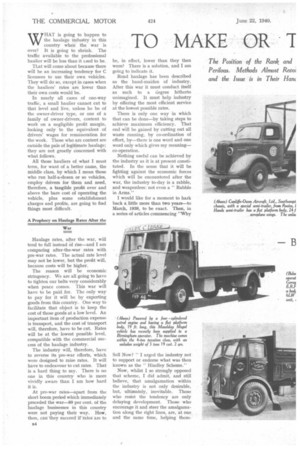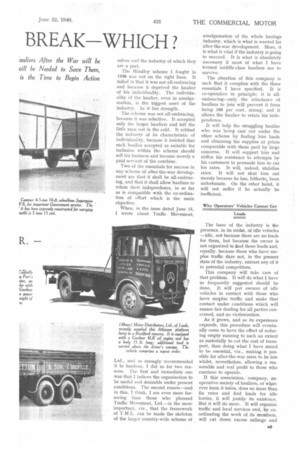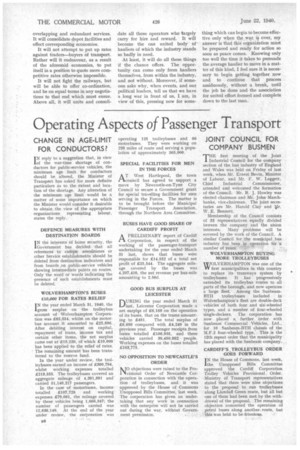TO MAKE OR BREAK WHICH?
Page 30

Page 31

Page 32

If you've noticed an error in this article please click here to report it so we can fix it.
The Position of the Rank and Perilous. Methods Almost Revoq and the Issue is in Their Hanc auliers After the War will be viii be Needed to Save Them, is the Time to Begin Action
WHAT is going to happen to the haulage industry in this country when the war is over? It is going to shrink. The traffic available to the professional hauler will be less than it used to be.
That will come about because there will be an increasing tendency for C licensees to use their own vehicles. They will do so, except in cases when the hauliers' rates are lower than their own costs would be In nearly all cases of one-way traffic, a small haulier cannot cut to that level and live, unless he be of the owner-driver type, or one of a family of owner-drivers, content to work on a negligible profit margin, looking only to the equivalent of drivers' wages for remuneration for the work. Those who are content are outside the pale of legitimate haulage; they are not greatly concerned with what follows.
All those hauliers of what I must term, for want of a better name, the middle class, by which I mean those who run half-a-dozen or so vehicles, employ drivers for them and need, therefore, a tangible profit over and above the bare cost of operating the vehicle, plus some establishment charges and profits, are going to find things most difficult.
A Prophecy on Haulage Rates After the
War
Haulage rates, after the war, will tend to fall instead Of rise—and I am comparing after-the-war rates with pre-war rates. The actual rate level may not be lower, but the profit will, because costs will be higher.
The reason will be economic stringency. We are all going to have to tighten our belts very considerably when peace comes. This war will have to be paid .for. The only way to pay for it will be by exporting goads from this country. One way to facilitate that object is to keep the cost of those goods at a low level. An important item of production expense is transport, and the cost of transport will, therefore, have to be cut. Rates will be at the lowest possible level, compatible with the commercial success of the haulage industry.
The industry will, therefore, have to reverse its pre-war efforts, which were designed to raise rates. It will have to endeavour to cut rates. That is a hard thing to say. There is no one in this country who is more vividly aware than I am how hard it is.
At pre-war rates—apart from the short boom period which immediately preceded the war-80 per cent, of the haulage businesses in this country were not paying their way. How, then, can they succeed if rateg are to
B4
be, in effect, lower than they then were? There is a solution, and I am going to indicate it.
Road haulage has been described as the hand-maiden of industry. After this war it must conduct itself as such to a degree hitherto unimagined. It must help industry by offering the most efficient service at the lowest possible rates.
There is only one way in which that can be done—by taking steps to achieve maximum efficiency. That end will be gained by cutting out all waste running, by co-ordination of effort, by—there is one word and one word only which gives my meaning— co-operation.
Nothing useful can be achieved by the industry as it is at present constituted. In the sense that it will be fighting against the economic forces which will be encountered after the war, the industry to-day is a rabble, and weaponless: not even a" Rabble in Arms."
I would like for a moment to hark back a little more than two years—to March, 1938, to be exact. Then, in a series of articles commencing "Why
Sell Now? "I urged the industry not to support or endorse what was then known as the " Hindley Scheme."
Now, whilst I so strongly opposed that scheme, I did admit, and still believe, that amalgamation within the industry is not only desirable, but, ultimately, inevitable. Those who resist the tendency are only delaying development. Those who encourage it and steer the amalgamation along the right lines, are, at one and the same time, helping them
selves arid the industry of which they are a part.
The Hindley scheme I. fought in 1938 was not on the right lines. It failed in that it was not all-embracing and because it deprived the haulier of his individuality. The individu ality of the haulier, even in amalgamation, is the biggest asset of the industry. In it lies strength.
The scheme was not all-embracing, because it was selective. It accepted only the larger hauliers and left the little man out in the cold. It robbed the industry of its characteristic of individuality, because it insisted that each haulier accepted as suitable for inclusion within the scheme should sell his business and become merely a paid servant of the combine.
Two of the essentials for success in any scheme of after-the-war develop ment are that it shall be all-embrac ing, and that it shall allow hauliers to retain their independence, in so far as is compatible with the co-ordination of effort which is the main objective.
When, in the issue dated June 15, I wrote about Traffic Movement, Ltd., and so strongly 'recommended it to hauliers, I did so for two reasons. The first and immediate one was that I believe the organization to be useful and desirable under present conditions. The second reason—and in this, I think, I am even more farseeing than those who planned Traffic Movement, Ltd.—is the more important, viz., that the framework of T.M.L. can be made the skeleton of the larger country-wide scheme of amalgamation of the whole haulage industry, which is what is wanted for after-the-war development. More, it is what is vital if the industry is going to succeed. It is what is absolutely necessary if most of what I have termed middle-class hauliers are to survive.
The situation of this company is such that it complies, with the three essentials I have specified. It is co-operative in principle; it is allembracing—only the reluctance of hauliers to join will prevent it from being 100 per cent, strong; and it allows the haulier to retain his independence.
It will help the struggling haulier who was being cast out under the other scheme by finding him loads and obtaining his supplies at prices comparable with those paid by large concerns. It will support him and stiffen his resistance to attempts by his customers to persuade him to cut his rates. It will, indeed, stabilize rates. It will not shut him out merely because he has, hitherto, been unfortunate. On the other hand, it will not suffer if he actually be inefficient Why Operators' Vehicles Cannot Get Loads The bane of the industry is the presence, in its mid.st, of idle vehicles —idle, not because there are no loads for them, but because the owner is not organized to find those loads and, equally, because those who have surplus traffic dare not, in the present state of the industry, entrust any of it to potential competitors.
This company will take care of that problem. It will do what I have so frequently suggested should be done. It will put owners of idle vehicles in contact with those who have surplus traffic and make that contact under conditions which will ensure fair dealing for all parties concerned, and no victimization.
As it grows, and as its experience expands, this procedure will eventually come to have the effect of reducing empty running to such an extent as materially to cut the cost of transport, thus doing what I have stated to be essential, viz., making it possible for after-the-war rates to be low whilst, nevertheless, allowing a reasonable and real profit to those who continue to operate.
If this association, company, cooperative society of hauliers, or whatever form it takes, does no more than fix rates and find loads for idle lorries, it will justify its existence. But it will do more. It will organize traffic and local services and, by coordinating the work of its members, will cut down excess mileage and overlapping and redundant services. It will consolidate depot facilities and effect corresponding economies.
It will not attempt to put up rates against traders—buyers of transport. Rather will it endeavour, as a result of the aforesaid economies, to put itself in a position to quote more competitive rates otherwise impossible.
It will not fight the railways, but will be able to offer co-ordination, and be on equal terms in any negotiations to that end which must ensue. Above all, it will unite and consoli date all those operators who largely carry for hire and reward. It will become the one united body of hauliers of which the industry stands so badly in need.
At least, it will do all these things if the chance offers. The opportunity can come only from hauliers themselves, from within the industry, and not without. Moreover, if someone asks why, when events, and our political leaders, tell us that we have a long war in front of us, I am, in view of this, pressing now for some thing which can begin to become effective only wben the war is over, my answer is that this organization must be prepared and ready for action so soon as peace comes. Knowing only too well the time it takes to persuade the average haulier to move in a matter of this kind, I feel sure it is necessary to begin getting together now and to continue that process assiduously, without a break, until the job be done and the association for united effort formed and complete down to the last man.




























































